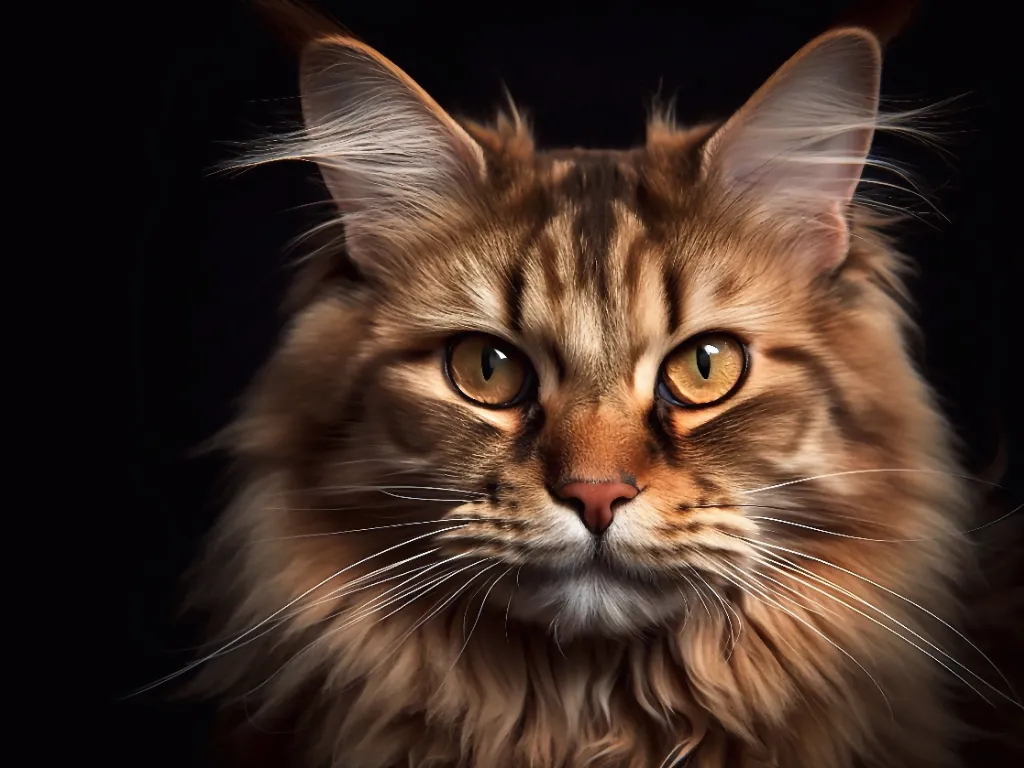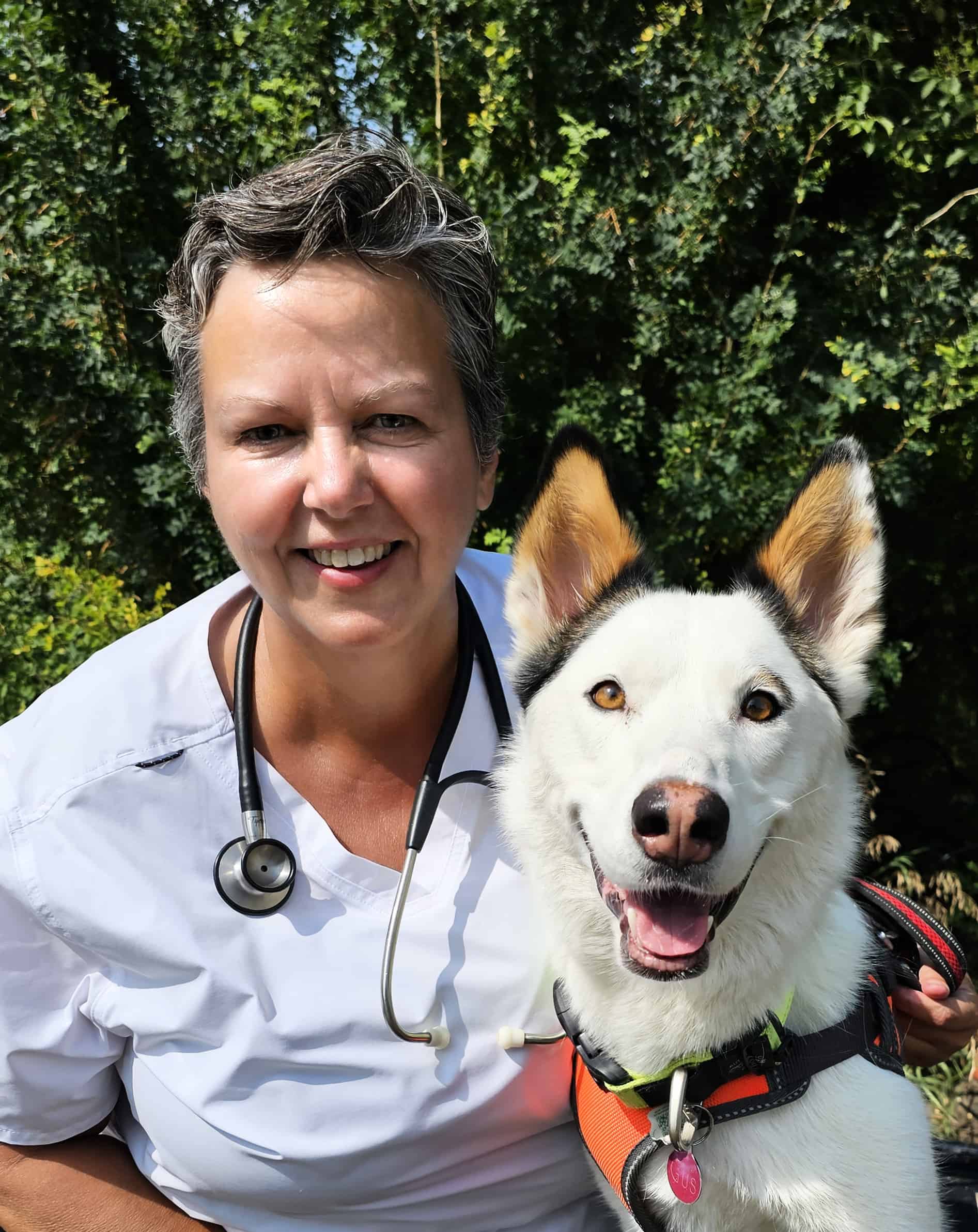The Maine Coon cat, with its trademark impressive size, tufted ears and lush coat, is widely recognized by cat lovers around the world. Sometimes owners of cats who display similar characteristics wonder if their own cat has some Maine Coon in it.
But how would one tell if their cat is a Maine Coon mix? What exactly makes a Maine Coon so unique, and how can you identify these traits in your own feline friend, particularly if they’re a mixed breed?
In this article, we explore the hallmark characteristics of Maine Coons and their hybrids. From physical attributes to personality quirks, learn how to tell whether your cat could be part of this enchanting breed’s family tree.
Join us as we decode the secrets of Maine Coon ancestry in mixed breed cats, providing you with the insights needed to spot these regal traits in your own cat.
Understanding The Maine Coon Breed
The Maine Coon cat, with its majestic appearance and captivating personality, is a beloved and distinctive breed that has captured the hearts of cat enthusiasts around the world.
The origin of the Maine Coon cat is shrouded in a mix of fact and folklore, contributing to its enigmatic allure. According to one popular legend, the Maine Coon is a result of crossbreeding between domestic cats and raccoons, accounting for its large size and bushy tail.
While this charming tale is completely false – cats and raccoons are after all two totally different species and cannot interbreed – the true lineage of the Maine Coon is rooted in American history.
Believed to have originated in the rugged northeastern regions of the United States, particularly Maine, the Maine Coon is thought to be a natural breed that adapted to the harsh climate and demanding conditions of the region. Its thick, water-resistant fur and tufted ears are indicative of its evolution in cold and damp environments.
One of the most striking features of the Maine Coon is its impressive size. Often referred to as the “gentle giants” of the cat world, Maine Coons are known for their substantial build, sturdy bone structure, and muscular physique. They are the largest domestic cat breed around.
Adult males can weigh between 13 to 18 pounds or more, while females typically range from 8 to 12 pounds. Their size is further accentuated by their long, flowing coat and bushy tail, which contribute to their regal and imposing presence.
Beyond their captivating appearance, Maine Coons are renowned for their endearing and engaging personalities. Often referred to as “gentle giants,” these large cats are known for their friendly and sociable nature.
The Maine Coon cat breed is renowned for its impressive size, often earning them the title of “gentle giants” in the feline world.
Maine Coon Physical Characteristics
Maine Coon mixed breed cats often inherit distinct characteristics from their Maine Coon lineage, although not all of these traits will necessarily be present.
While some features like size, tufted ears, bushy tails, or sociable behavior may be noticeable, the expression of these traits can vary. Genetic factors in mixed-breed cats can lead to a mix of Maine Coon-like attributes, resulting in a delightful and unpredictable range of appearances and behaviors.
If you are wondering if your furry friend has some Maine Coon in it, here are some of the traits that you should be looking for in your cat.
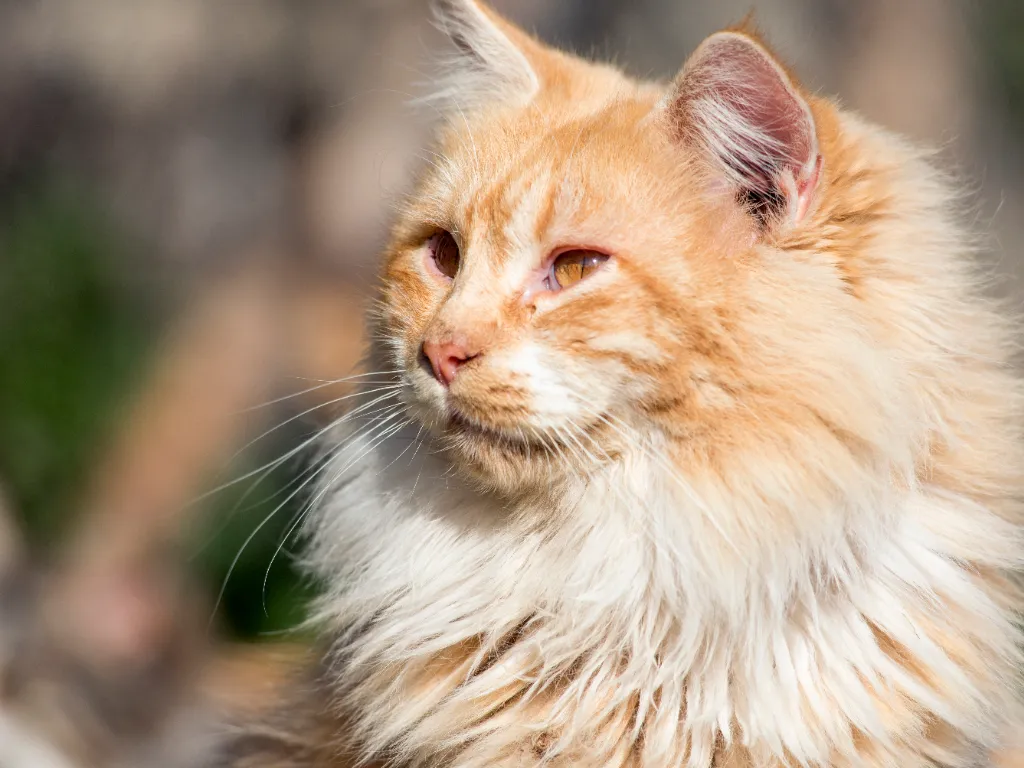
Size
Many years ago, I had a cat that I suspected of being part Maine Coon. Her background was a complete mystery, as she and two littermates were left orphaned at just a few days old.
Early on, there was nothing to make me suspect a Maine Coon mix. She was a basic tortoiseshell short hair cat – until she grew up. By the time she reached her full size, she was almost 18 lbs, and she wasn’t fat!
Her size made me suspect Maine Coon in her parentage somewhere. This was supported by her two littermates, who also grew to be quite large. Plus, they had the long hair and tufted ears typical of the Maine Coon.
Even her death supported Maine Coon background – sadly, she died suddenly just before her fourth birthday from heart disease known to be prevalent in the Maine Coon breed.
Like my mystery cat, Maine Coon mixes frequently have the potential to display larger-than-average proportions, a trait inherited from their Maine Coon ancestry.
This propensity for size is often passed down to their mixed-breed descendants, resulting in cats and kittens that may surpass the typical dimensions of other domestic breeds.
The genetic influence of the Maine Coon’s robust build and substantial bone structure can lead to Maine Coon mixes growing larger and heavier than the average house cat. It’s not uncommon for these cats to have longer bodies, taller legs, and a more substantial overall appearance.
However, genetic variation plays a role, and not all Maine Coon mixes will necessarily exhibit this larger size. Some mixes might inherit a more balanced blend of proportions, resulting in a cat that falls within the typical size range of domestic cats.
Nonetheless, the potential for Maine Coon mixes to showcase impressive dimensions remains a notable aspect of their heritage.
Long Coat
The Maine Coon’s fur coat is a result of genetic attributes and functional adaptation. This unique, shaggy coat reflects the breed’s evolutionary history and includes key traits that originated in the Maine landscape and genetic lineage.
Length: The Maine Coon has distinctive long fur that gracefully drapes over its well-structured body. This longer fur length is historically significant, as it helped the breed adapt to colder climates.
When it comes to Maine Coon mixed breeds, the hereditary transmission of this specific fur length can vary. While some mixed breeds may still have this characteristic length, others may have a more subtle expression due to the complex interaction of genetic factors.
Certainly, if my own mystery cat had Maine Coon genetics, it did not show up in her short fur coat at all.
Texture: The Maine Coon’s fur texture, characterized by density and water-resistant properties, echoes its pragmatic origins in the damp Maine environment.
This characteristic texture may or may not be present in mixed breed cats. Genetic diversity may lead to modifications in fur texture, resulting in coats varying in softness, density, and feel.
Patterns: The Maine Coon breed’s genetic diversity is highlighted by its many different coat patterns. These patterns range from various tabby designs to solid colors to any variation in between, much like many other different breeds.
As such, the pattern or color of the cat’s fur coat really does not provide any information as to whether it has Maine Coon genetics or not.
Seasonal Adaptation: The Maine Coon’s seasonal coat adaptation is a fascinating phenomenon that showcases its ability to adjust to changing environments. While mixed breeds may not exhibit this trait as prominently, it serves as a reminder of the breed’s remarkable adaptability.
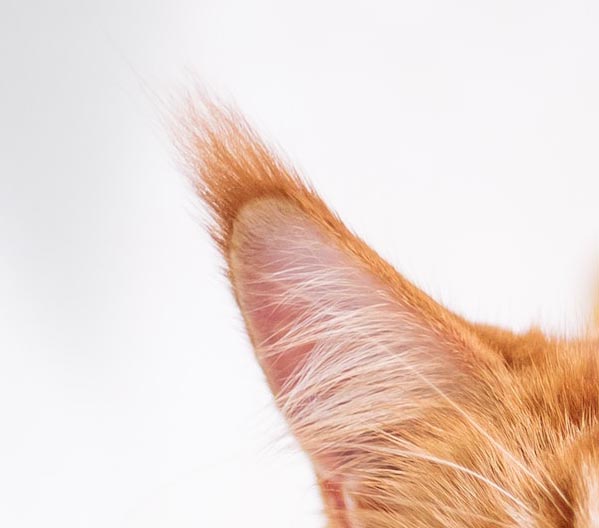
Ears
The Maine Coon cat’s ears are an unmistakable feature that adds to their captivating and regal look. These remarkable auditory organs have several distinct characteristics that set them apart and reflect the breed’s unique genetic makeup.
Size and Lynx-Like Tufts: Maine Coon cats have notably large and tufted ears that resemble those of wild lynx. The tufts of fur at the tips of their ears enhance their striking appearance and provide extra insulation against colder climates. This is a prominent trait often found in purebred Maine Coons.
Placement and Set: The Maine Coon has ears that are set widely apart on the head, which gives them a distinctive appearance. This positioning creates an alert and attentive expression, a characteristic trait that adds to their unique visual appeal.
Genetic Inheritance in Mixed Breeds: When it comes to Maine Coon mixed breeds, the inheritance of ear characteristics can vary due to genetic influences from other breeds.
While some Maine Coon traits, like ear size and tufting, can be passed on, their manifestation can be influenced by the genetic contributions from the non-Maine Coon lineage. In certain cases, mixed-breed offspring may exhibit pronounced Maine Coon ear characteristics.
However, due to the complex interaction of genes from both Maine Coon and other breeds, there may be instances where ear size, tufts, or positioning are less noticeable or not as strongly expressed.
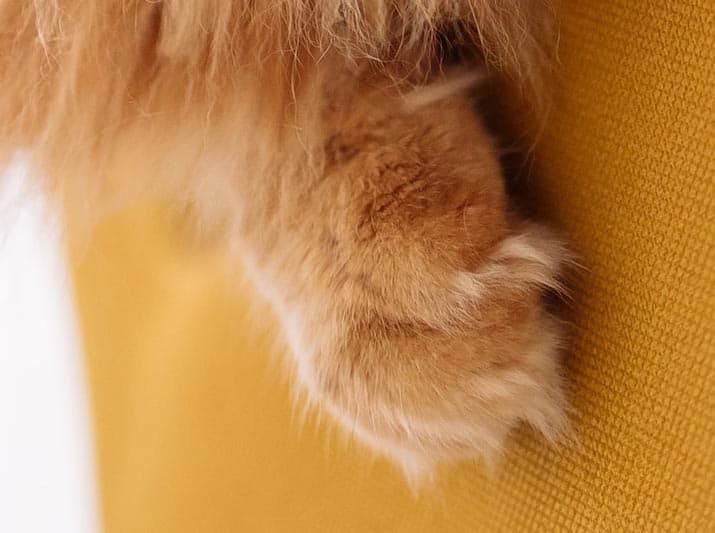
Paws
Size and Proportions: Maine Coon cats have large and well-proportioned paws that provide a sturdy foundation for their substantial bodies. These oversized paws are a notable trait that often catches the eye.
Toe Tufts: Maine Coon cats have a charming characteristic – tufts of fur between their toes. These tufts, similar to their tufted ears, serve a practical purpose: helping them adapt to cold and damp environments.
Acting like natural “snowshoes,” they provide insulation and traction, enabling Maine Coons to navigate different terrains.
Large paws and toe tufts may suggest Maine Coon heritage, but there are other cats with the same features, such as the Norwegian Forest cat and the Ragdoll cat.
Ruff or Mane
The Maine Coon is known for its distinctive ruff (or mane) around the face, which adds to its dignified appearance. In mixed-breed cats, the presence of this feature can be unpredictable.
Some mixed breeds may have a pronounced ruff that enhances their regal look, while others may have a more subtle manifestation, influenced by a mix of genetic traits.
Bushy Tail
The signature bushy tail of the Maine Coon is a focal point, likely to be inherited by subsequent mixed-breed generations. However, the extent of bushiness observed in this tail can differ.
While specific Maine Coon mixes may present a luxuriant and voluminous tail, others may feature a more understated presentation, reflecting the intricate interplay of inherited genetic attributes.
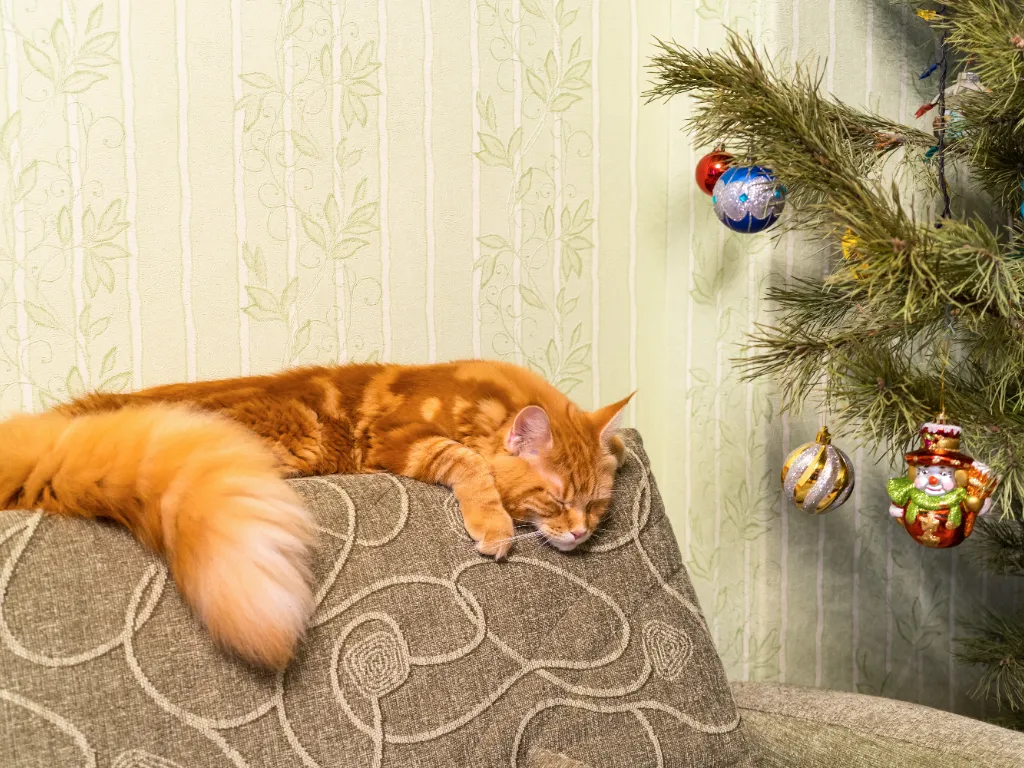
The Personality Of A Maine Coon Cat
The Maine Coon cat is well-known for its captivating personality. It possesses a unique blend of friendliness, sociability, and intelligence, making it a beloved feline companion.
Even in mixed-breed cats with Maine Coon lineage, these distinctive personality traits are often inherited, resulting in a charming and loyal companion.
Friendliness and Sociability: The inherent friendliness and sociability of the Maine Coon personality are frequently passed on to mixed-breed descendants. These cats tend to form strong bonds with their human companions and readily engage in interactive play.
They often enjoy being part of the household’s activities, following their humans around and seeking opportunities for affection and interaction.
Playful Intelligence: Maine Coons are known for their playful nature and for being very intelligent cats. This delightful combination results in cats that thrive on interactive play and mental stimulation.
When present in mixed-breed cats, this playful intelligence can lead to engaging interactions and dynamic companionship.
Other Breed Personalities Shining Through: However, the intriguing aspect of mixed-breed cats lies in the blending of personality traits from different lineages.
For example, if a Maine Coon is crossed with a Siamese cat, the Maine Coon’s sociability might intersect with the Siamese’s vocal and communicative nature. This could result in a super chatty cat that not only seeks social interaction but also expresses itself through vocalizations, creating a lively and expressive companion.
Similarly, when mixed with a breed like the Ragdoll, known for its laidback and friendly disposition, the Maine Coon’s friendly nature could harmonize with the Ragdoll’s calm demeanor. This could yield a cat that embodies both the Maine Coon’s affability and the Ragdoll’s relaxed and easygoing attitude, providing a balanced and affectionate companion.
In the world of mixed-breed cats, the interplay of personality traits offers a delightful range of possibilities. The Maine Coon’s inherent traits create a strong foundation, while the infusion of other breed personalities adds layers of complexity and uniqueness to each individual cat.
Do Maine Coon Health Problems Affect Mixed Breed Cats?
Maine Coon cats can be prone to certain health issues due to their genetic makeup and lineage. It’s important to consider how these health problems might affect mixed breed cats with Maine Coon ancestry, taking into account the genetic inheritance patterns and potential risks.
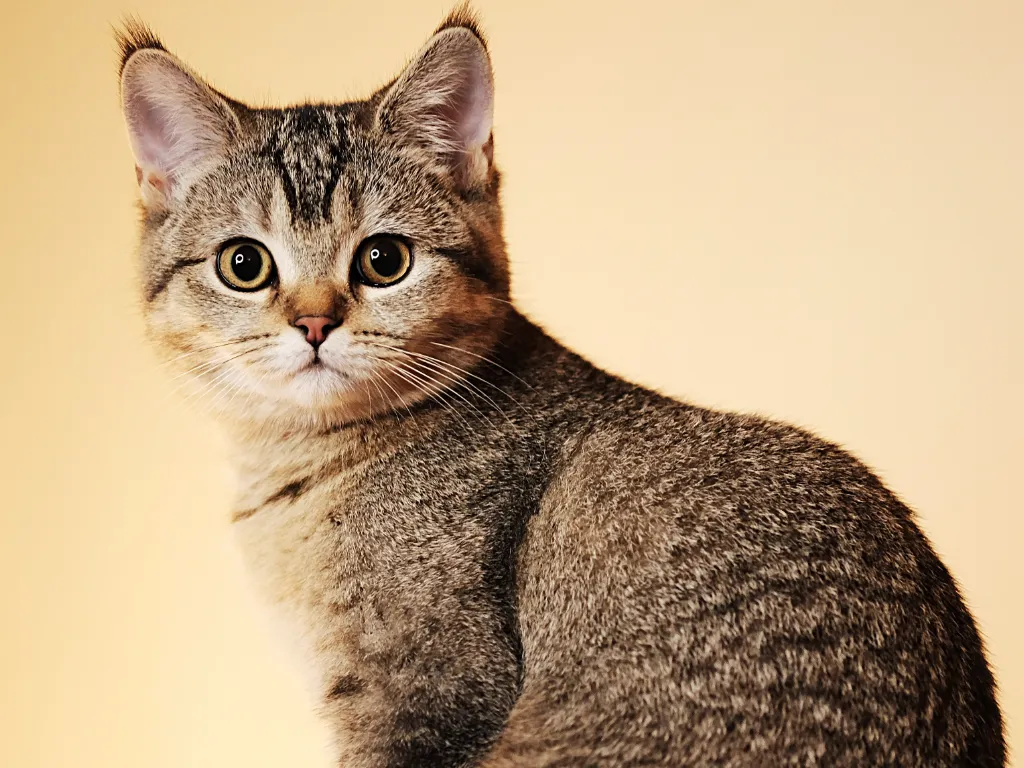
Genetic Inheritance and Health Conditions
Certain health problems in Maine Coon cats are influenced by genetic inheritance.
Some conditions may require specific combinations of genes from both parents to manifest. In these cases, if a mixed breed cat has only one Maine Coon parent carrying the gene, the condition may not manifest, but the cat could still be a carrier.
This underscores the importance of understanding the genetic background of both parents in mixed breed litters.
Hip Dysplasia: Maine Coons are prone to hip dysplasia, a condition where the hip joint doesn’t develop properly. This can lead to discomfort and reduced mobility. Around 25% of Maine Coons are impacted by this condition, with male cats exhibiting a slightly higher prevalence compared to females.
This high prevalence indicates a genetic component, though the exact genetic cause has not been identified. There is likely more than a single genetic component at play.
Mixed breed cats with Maine Coon ancestry might inherit a predisposition to hip dysplasia, although the severity of the condition can vary. Genetic influence from the non-Maine Coon parent might also play a role.
Hypertrophic Cardiomyopathy (HCM): HCM is a heart condition prevalent in Maine Coons. Maine Coons have a genetic association with HCM, specifically the A31P genetic mutation.
Cats with two copies of this gene face a high risk of sudden death before the age of four. Those with one copy have a longer lifespan but are still susceptible to developing the disease.
While it’s possible for a mixed breed cat to inherit the Maine Coon’s genetic predisposition for HCM, the likelihood of developing the condition might be influenced by the genetic diversity introduced by the other breed.
In addition, since they need two Maine Coon parents to inherit two copies of the gene, mixed breed cats are unlikely to develop the most severe form of the disease.
Spinal Muscular Atrophy (SMA): SMA is a genetic disorder in Maine Coons that affects the spinal cord’s motor neurons, leading to weakened muscles and mobility issues.
SMA follows an autosomal recessive inheritance pattern in cats. This means that cats carrying one copy of the gene are disease carriers, but they themselves will not develop SMA. However, they can pass the gene on to their offspring.
On the other hand, cats with two copies of the gene will develop SMA, which typically manifests in kittens between the ages of 3 and 4 months.
This means that a crossbreed cat with one Maine Coon parent will not develop the disease, but it still has a chance of being a carrier for the gene if the Maine Coon parent was a carrier.
Polycystic Kidney Disease (PKD): PKD is a hereditary condition that causes cysts to form in the kidneys, which eventually can lead to kidney failure. Maine Coons are known for being predisposed to this condition, and it is possible for mixed breeds to inherit this condition from their Maine Coon parent.
Dental Issues: Maine Coons are known for dental problems like stomatitis and periodontal disease. While these issues might have a genetic component, they can also be influenced by environmental factors and dental care.
Mixed breed cats with Maine Coon ancestry might still be susceptible, but the extent could vary based on the interplay of genetics and other influences.
Purebred vs. Crossbreed Considerations: The health problems in Maine Coon cats can influence mixed breed descendants, but the impact and presentation can be influenced by the genetic diversity introduced by the other breed.
Regular veterinary care, health screenings, and responsible breeding practices, whether raising purebred cats or crossing with other breeds, are essential to ensure the well-being of resulting kittens.
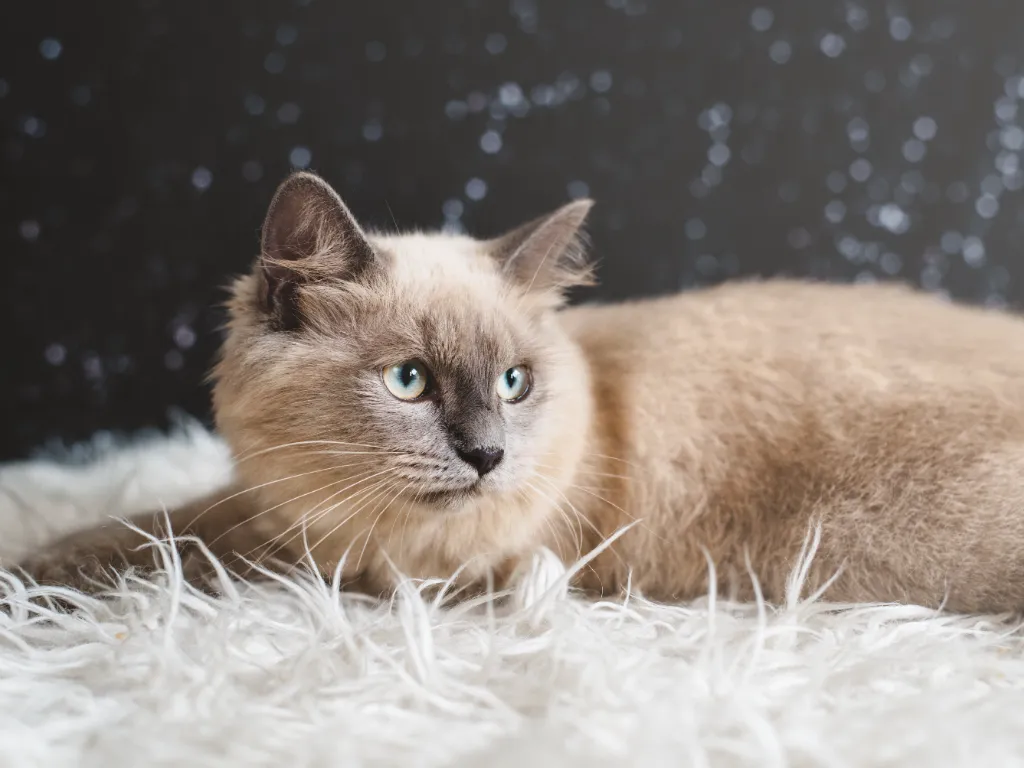
Maine Coon Mix Characteristics Not Helping? How To Tell For Certain If Your Cat Is A Maine Coon
So far, we have gone over the characteristics to look for in your cat if you suspect it might have Maine Coon parentage. But these characteristics may not always be present in Maine Coon crosses, and some characteristics are also present in other breeds.
So how can you tell for sure?
Parentage testing is available that can give you insights into your cat’s genetic heritage. It is the only way to know for sure if your cat has Maine Coon lineage.
This testing involves analyzing your cat’s DNA and comparing it to genetic markers associated with the Maine Coon breed. Let’s explore how parentage testing works and how it can help identify if your cat is a Maine Coon or has Maine Coon ancestry.
Genetic Markers and Breed Identification
Every breed, including the Maine Coon, carries distinct genetic markers that contribute to their unique physical traits, such as coat color, pattern, size, and other breed-specific characteristics.
Parentage testing focuses on identifying these markers in your cat’s DNA and comparing them to established breed standards for the Maine Coon.
Comparative Analysis
Parentage testing involves comparing your cat’s genetic markers to a database of known Maine Coon genetic profiles. If your cat’s DNA closely matches these markers, it suggests a strong likelihood of Maine Coon ancestry.
The more genetic markers that align with the Maine Coon breed, the higher the probability that your cat has Maine Coon lineage.
Verification of Pedigree
Genetic testing can be particularly useful if you have a cat that you suspect might be a Maine Coon mix or if the cat’s lineage is uncertain. By comparing your cat’s DNA to the DNA of known Maine Coon cats, you can verify the accuracy of pedigree information and gain a clearer understanding of your cat’s genetic heritage.
Understanding Mixed Heritage
If your cat is a mixed breed with Maine Coon ancestry, parentage testing can help quantify the proportion of Maine Coon genes in your cat’s genetic makeup. This can provide insight into which traits are likely to be more prominent based on the percentage of Maine Coon heritage.
Confidence and Accuracy
Parentage testing is a scientifically rigorous process that relies on advanced DNA analysis techniques. As a result, the results are highly accurate and reliable, providing a strong basis for determining your cat’s breed heritage.
Parentage testing offers a precise and scientifically-backed method to determine if your cat has Maine Coon ancestry. By comparing your cat’s DNA to established breed standards and known genetic markers, you can gain a deeper understanding of your cat’s genetic background, whether it’s a purebred Maine Coon or a mixed breed with Maine Coon lineage.
Final Words About Maine Coon Mix Cats
As you observe your cat’s features and personality traits, you might find subtle indications that hint at Maine Coon parentage. The imposing size, tufted ears, and sturdy paws can be telling signs of shared heritage. A sociable and intelligent demeanor might also reflect the Maine Coon’s distinctive personality.
However, when it comes to cats with unknown lineage, certainty is elusive. The surefire way to determine if your cat has Maine Coon ancestry is through parentage testing. This scientific method offers a conclusive answer, putting to rest any doubts about your cat’s genetic background.
So, while those hints in your cat’s appearance and behavior may point toward Maine Coon roots, if you need a solid answer it is a good idea to get genetic testing done.
One thing we do know for certain though – Maine Coon or not, cats are sure to bring joy and companionship to your life!
Want to learn more about Maine Coon cats? Head on over and read our complete Maine Coon breed information and care guide here!
Sources:
- https://vgl.ucdavis.edu/services/parentage
- https://www.vet.cornell.edu/departments-centers-and-institutes/cornell-feline-health-center/health-information/feline-health-topics/hip-dysplasia
- https://www.mdpi.com/2076-2615/11/9/2482
- https://vgl.ucdavis.edu/test/maine-coon-hcm
- https://vgl.ucdavis.edu/test/maine-coon-sma
- https://pubmed.ncbi.nlm.nih.gov/23735675/

